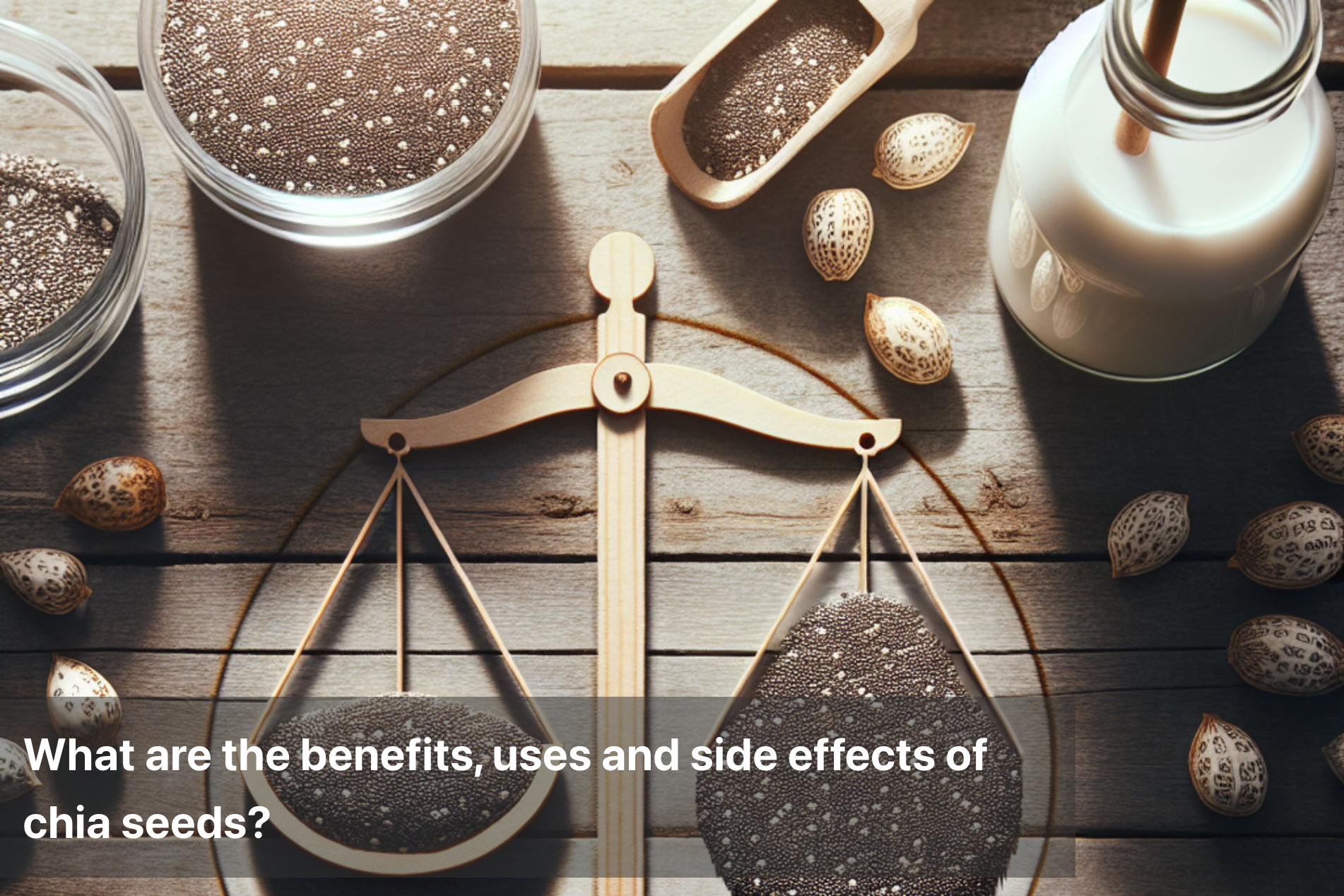
What are the benefits, uses and side effects of chia seeds?
Chia seeds, small black or white seeds from the Salvia hispanica plant, are a modern superfood with roots in ancient Aztec and Mayan diets. Native to Central and South America, they were prized for their energy-boosting properties and have gained worldwide popularity due to their nutritional richness.
These seeds are packed with omega-3 fatty acids, fiber, protein, and essential vitamins and minerals. Two tablespoons of chia seeds contain about 11 grams of fiber and 5 grams of protein, making them a great addition to smoothies, yogurt, and baked goods, enhancing nutritional value with minimal effort.
Chia seeds are incredibly versatile, used in puddings, energy bars, and as an egg substitute in vegan recipes. They support weight management, digestion, and heart health, but should be consumed in moderation to avoid potential side effects. Understanding both the benefits and precautions will help you fully enjoy their nutritional power.

Nutrition Table for 1 Tablespoon (12 grams) of Chia Seeds
Nutrient |
Amount |
% Daily Value (DV)* |
|---|---|---|
Calories |
58 kcal |
3% |
Protein |
2 g |
4% |
Calcium |
63 mg |
5% |
Magnesium |
40 mg |
10% |
Phosphorus |
81 mg |
6% |
Iron |
1 mg |
6% |
Zinc |
0.5 mg |
5% |
Benefits of Chia Seeds
Rich in Nutrients: Chia seeds are packed with essential nutrients including fiber, protein, and omega-3 fatty acids. These elements contribute to overall health.
Heart Health: The omega-3 fatty acids found in chia seeds are known to support heart health by reducing inflammation and lowering cholesterol levels.
High in Fiber: One of the main benefits of chia seeds is their high fiber content, which aids in digestion and helps promote a feeling of fullness.
Weight Management: Due to their ability to absorb water and expand, chia seeds can help control appetite and support weight loss efforts.
Bone Health: Chia seeds are a good source of calcium, phosphorus, and magnesium, all of which are vital for maintaining strong bones.
Blood Sugar Control: These seeds may improve insulin sensitivity, helping to stabilize blood sugar levels.
Chia Seeds Uses
Chia Gel for Skincare: The hydrating properties of chia gel can be applied as a natural face mask for moisturized skin.
Chia Seed Sprouts: Grow chia sprouts at home to use as a fresh garnish for salads and sandwiches.
Homemade Beverages: Add to lemonades, iced teas, or flavored water for a fun, nutrient-rich drink.
Energy-Boosting Snacks: Combine chia seeds with nuts, dried fruits, and honey to create quick energy bites.
Pet Food Supplement: Sprinkle a small amount of chia seeds on pet food to enhance their diet with omega-3s and fiber.
Thickening Agent in Desserts: Use chia seeds to thicken custards, mousse, or homemade ice cream.
Chia Seed Side Effects
Increased Risk of Kidney Stones: Chia seeds contain oxalates, which, when consumed in excess, can contribute to kidney stones in susceptible individuals.
Digestive Issues: Due to their high fiber content, consuming large amounts of chia seeds without adequate hydration can lead to bloating, gas, or constipation. It’s crucial to drink plenty of water when consuming chia seeds.
Risk of Choking: When chia seeds are consumed dry, they absorb liquid and expand, which may pose a choking risk if not properly hydrated beforehand.
Allergic Reactions: Though rare, some individuals may have an allergic reaction to chia seeds, resulting in symptoms like hives, swelling, or difficulty breathing.
Interference with Medications: Chia seeds could interact with certain medications, such as blood thinners, due to their omega-3 content, which can affect blood clotting. Always consult a healthcare provider if you're on medication.
Blood Pressure Concerns: Chia seeds are rich in omega-3 fatty acids, which can lower blood pressure. People on blood pressure medication should monitor their intake to avoid excessive drops in blood pressure.
Recipes with Chia Seeds
Chia Seed Crackers: Combine chia seeds, water, almond flour, and seasonings, roll out dough, cut into shapes, and bake at 350°F for 15-20 minutes.
Chia Fresca: Stir 1 tbsp chia seeds into 1 cup water, add lemon juice and honey, and let it sit for 10-15 minutes before drinking.
Chia Seed Pancakes: Mix flour, chia seeds, baking powder, milk, egg, and syrup into a batter, cook on a skillet, and serve with toppings.
Chia Seed Jam: Cook mashed berries with chia seeds and honey, simmer until thickened, and store in a jar for a natural jam.
Chia Energy Bars: Combine oats, chia seeds, honey, nut butter, and optional chocolate chips, press into a dish, refrigerate, and cut into bars.

Versatile Uses of Chia Seeds in Your Diet
Chia seeds offer a myriad of health benefits that can enhance your diet. Incorporating these tiny seeds can provide significant advantages, including their high nutrient density, which supports overall well-being. Many people appreciate the benefits of chia seed, such as improved digestion, richer nutrient absorption, and potential weight management.
Additionally, their versatility allows for various chia seeds uses, from smoothies to salads, making them easy to add to your meals. When discussing the best chia seeds, opt for those that are organic and sourced sustainably.
However, it’s essential to be aware of chia seed side effects. Some individuals may experience digestive issues if consumed in excessive amounts. Understanding the balance between the numerous advantages of chia seeds and the potential side effects is crucial for making informed dietary choices.
As you explore chia seeds uses and benefits, keep in mind that moderation is key. They can be a remarkable part of your nutrition, but being mindful of your intake will help you fully enjoy their advantages while minimizing any risks. Therefore, embrace the goodness of chia seeds, but always listen to your body’s response.
This Blog post is an initiative by Lo! Foods, to provide accurate and Nutritionist / Doctor approved information related to Health. Lo! Foods is India's leading brand for Everyday Functional Foods. Foods designed for specific Health conditions or Needs. Lo! Foods also runs India's largest range of Low Carb Healthy Cloud Kitchens, under the brand names of Lo!, ProteinChef, ATH (All Things Healthy) and DiabeSmart.













Leave a comment
Your email address will not be published.